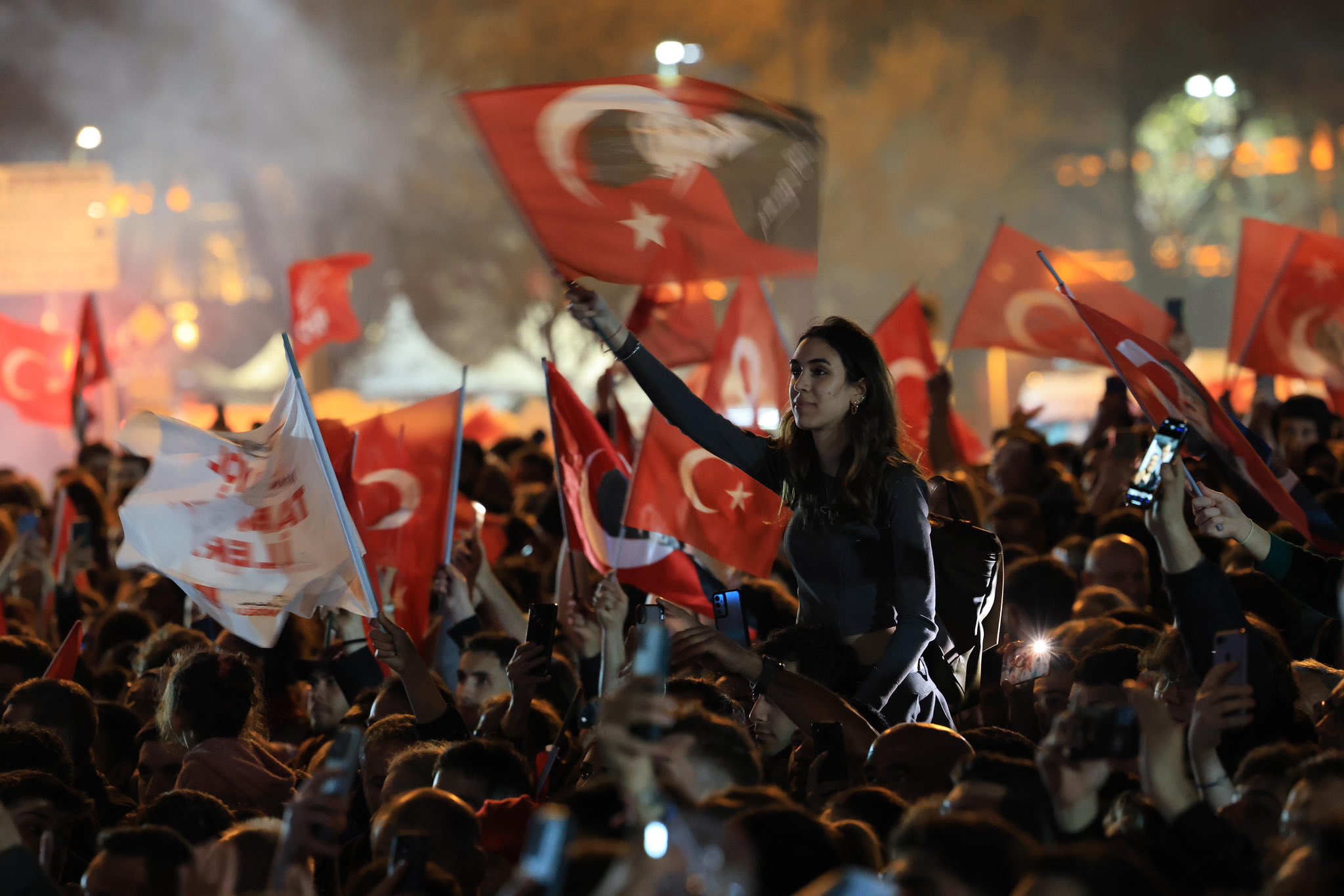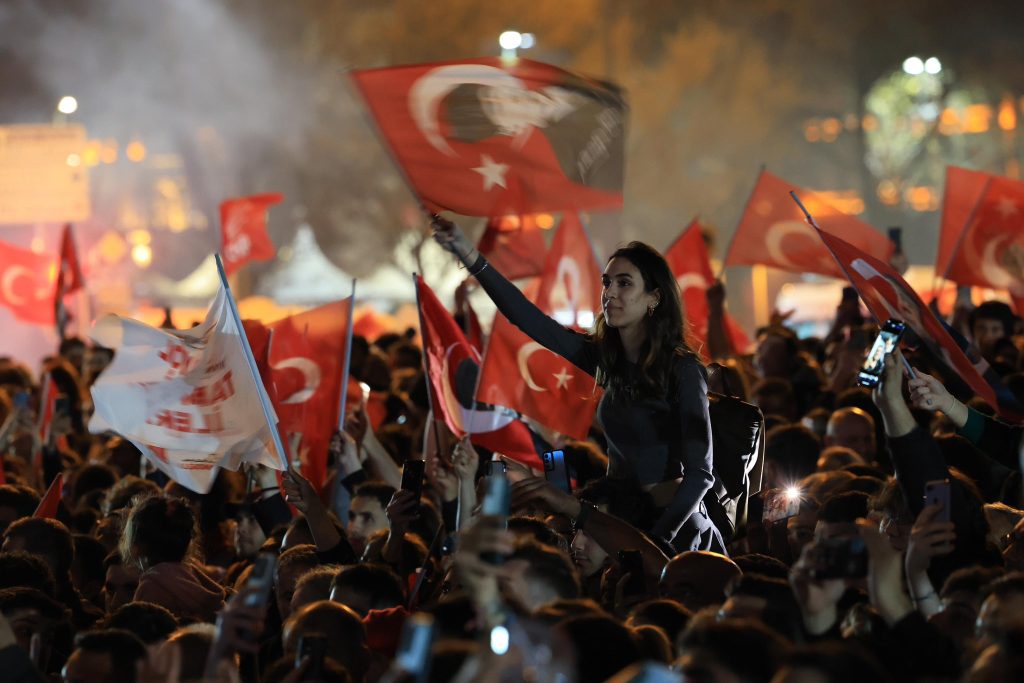

The unofficial results of the March 31 local elections in Türkiye have ushered in a significant shift in the country’s political landscape. Erdoğan has lost to a groundswell and there are three key aspects of this shift. (Photo: Ekrem İmamoğlu/X)
The unofficial results of the March 31 local elections in Türkiye have ushered in a significant shift in the country’s political landscape.
The Republican People’s Party (CHP) has seen a notable increase in its nationwide vote share, enabling it to assume control in cities where it has never held power before.
With 61 million voters casting their preferences favoured CHP-led administrations in 36 provinces. For the first time in 20 years, CHP’s electoral performance surpassed that of the Justice and Development Party (AKP), placing it at the forefront of Turkish politics. Securing mayoral seats in major metropolitan areas such as Istanbul, Ankara, Izmir, Bursa, and Balikesir, CHP has emerged as a dominant force in the local political arena.
According to data from the Anadolu Agency, with 99 percent of ballot boxes counted nationwide, CHP garnered 37 percent of the votes, followed closely by AKP with 35 percent. Other parties such as the Yeniden Refah Party, the Democracy and Progress Party (DEM), the Nationalist Movement Party (MHP), and the Good Party (IYI) secured varying shares of the vote, contributing to the diverse electoral landscape.
The outcome of the elections has resulted in changes of administration in 29 provinces across the country, signifying a significant reconfiguration of power dynamics at the local level.
Turning point in three key aspects
What does this shift in political landscape mean? This local election proved to be a turning point in three key aspects.
1. President and AKP leader Tayyip Erdoğan, expecting a great victory, instead suffered a significant defeat. As he stated in his famous “balcony speech” alongside only his wife Emine Erdoğan, this marked a pivotal moment in the 21-year rule of the AKP. We can say the decline has begun.
2. Erdoğan now faces not just one but two powerful opponents who could challenge him even in the presidencial race. Ekrem İmamoğlu in Istanbul and Mansur Yavaş in Ankara have emerged as natural leaders in Turkish politics.
3. Despite appearing weakest after the defeat in the 2023 elections, the CHP achieved one of its strongest results in history. Following the 1977 election under the leadership of Bülent Ecevit, which saw a vote share of over 41 percent, Özgür Özel (based on the results of provincial council elections considered as a general vote measure in local elections) brought the CHP to a vote share of over 37 percent. The AKP became the second party with a share of over 35 percent.
Three reasons for this transformation
The most potent indicators of the political climate change are these three turning points.
The three main reasons for this transformation were:
1. The economic crisis became the leading cause of the downward spiral that hit Erdoğan and his government. The backlash from retirees, workers, and the unemployed, which had been brewing for years, finally surfaced. Yes, there were similar difficulties in 2023, but back then, retirees and workers still held some hope in Erdoğan. The constant deferral of empty promises made before these elections were an effect, but what pushed the matters to a breaking point was Erdoğan’s likening of the retirees’ pensions to a “bottomless pit” as if the inflation weren’t his own doing.,
Erdoğan paid the price for underestimating the backlash from retirees and workers.
2. Following the defeat of the CHP in 2023 general elections, the decision to change the party leadership and bring Özgür Özel instead of Kemal Kılıçdaroğlu through a Congress was a risky move that paid off, thanks to the new management’s organizational understanding and work style. They managed to defeat Erdoğan with a younger team supported by the party organization. İmamoğlu in Istanbul and Yavaş in Ankara significantly contributed to this outcome by capturing the core voters of the CHP.
3. Arrogance. Erdoğan’s choice of Murat Kurum in Istanbul and Turgut Altınok in Ankara was primarily driven by the logic of not letting anyone outshine him. These were chosen to ensure that the votes actually went to Erdoğan. Erdoğan’s disregard for the Felicity Party and the Grand Unity Party in selecting candidates was also a sign of arrogance. He paid the price with the two metropolitan municipalities; Felicity Party won Şanlıurfa, and the Grand Unity Party won Sivas.
Losers of the election
Besides Erdoğan, there were three losers in the election:
1. Meral Akşener. İYİ Party leader Meral Akşener’s local elections campaign targeted not only Erdoğan and the AKP but also her 2019 and 2023 ally CHP. Her constant targeting the opposition CHP backfired. İYİ Party’s vote share dropped to nearly half of what it was in 2023. Calls for her resignation from within her party began in the early hours of the election.
2. Devlet Bahçeli. AKP’s “People’s Alliance” partner the MHP’s votes also halved, dropping to around 5 percent. They lost the municipalities they held. The most significant loss was the Manisa Metropolitan Municipality, which they entered with the support of the AKP, to the CHP, Özel’s electoral district. Similarly, the municipality of Kütahya, which had been held by the MHP since 1950, went to the CHP for the first time.
3. DEM. The Kurdish issue focused DEM Party faced unfairness due to the votes of military units deployed to the east and southeast for security reasons, making the election an example of injustice. However, the results in cities with significant Kurdish voter populations such as Istanbul, Izmir, Ankara, Mersin, Adana, and Antalya indicated that identity politics were beginning to unravel in major cities. Kurdish population voted for the CHP and brought the CHP candidates to the seat.
Winners of the election
The three winners of the election, aside from İmamoğlu and Yavaş, can be listed as follows:
1. Fatih Erbakan. The leader of the Felicity Party, Erbakan, took a strategic step by not entering the election under the AKP’s umbrella. The People’s Alliance began to falter from the moment Erbakan stated, “We will not be the spare tire.” Their criticism of Erdoğan’s policy towards Israel was particularly influential. With 60 mayoral positions, including Şanlıurfa and Yozgat, and a vote share of over 6 percent in provincial councils, they emerged as the third-largest party.
2. Özgür Özel. He became the example of old sayings “nothing can replace achievement” or “success covers all flaws.” He worked tirelessly despite the rumors that he is under influence of İmamoğlu. He trusted the party organization, especially the youth branches. For example Sinem Dedetaş, an activist and modern female engineer, was elected as the mayor of Üsküdar, a conservative district where Erdoğan also resides. The candidacy and vote count of women in Istanbul could have been further increased with candidates like Aslı Öymen in Adalar and Tülin Hadi in Kadıköy. However, they also faced obstacles within party factions.
3. Özer Sencar. MetroPoll research director Sencar, a week before the election, stated in a YetkinReport YouTube broadcast that İmamoğlu would win by a margin of 9 points and Yavaş by a “now impossible to close” gap, indicating a nationwide groundswell. Later, in MedyaScope, he reiterated this with even stronger emphasis to Ruşen Çakır, insisting on findings and evidence-based predictions. He also emerged as a winner of the election.
